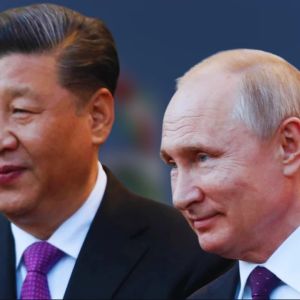
Xi Jinping and Vladimir Putin were both missing from the BRICS summit that kicked off Sunday in Rio de Janeiro, hosted by Brazilian President Luiz Inacio Lula da Silva. According to Bloomberg, neither leader showed up, and neither sent anyone with presidential weight to fill the gap. The two-day summit brought together leaders from the group’s expanded roster, but the image that stood out was the one without China, Russia, Egypt, Iran, and Saudi Arabia. Lula stood at the center of the summit’s family photo, with India’s Narendra Modi and South Africa’s Cyril Ramaphosa flanking him. On the outer edges stood Sergey Lavrov of Russia and Hossein Amir-Abdollahian of Iran. The photo, taken in front of Rio’s Sugarloaf Mountain, looked better organized than the chaotic Group of 20 photo back in November, where Joe Biden, Giorgia Meloni, and Justin Trudeau were all no-shows. But even with ten men posing for the shot, the absence of the most influential figures in the bloc made the group look half-baked. Putin stays away as Russia’s war economy runs out of gas Putin’s absence comes at a time when Russia’s economy, pushed forward for two years by weapons spending and oil money, is showing clear signs of collapse. The cracks are no longer subtle. Industrial production is falling. Inflation is high. Consumer spending is shrinking. The central bank already slashed its key rate in June and is preparing to cut again this month. The budget is deep in the red. Maxim Reshetnikov, Russia’s economy minister, said last month that the country is on the “verge of a recession.” Anton Siluanov, the finance minister, described the situation as a “perfect storm.” Putin, for now, denies the damage. “Reports of its death are greatly exaggerated,” he said, borrowing a line from Mark Twain. But in the same breath, he admitted that recession or stagflation “should not be allowed under any circumstances.” Russia’s economic performance in early 2025 says everything. The first quarter GDP grew by just 1.4%, compared to 4.5% in Q4 2024. Manufacturing just clocked its sharpest contraction in more than three years, data from S&P Global revealed. New car sales in June dropped 30% year-over-year, according to the Association of European Businesses. Russian firms cut output as energy revenues nosedive Russia’s real economy is bleeding. Rostselmash, the largest maker of tractors and harvesters in the country, announced in May that it would slash production and force its 15,000 workers to take annual leave early due to weak demand. Over in Siberia, electricity company Rosseti Sibir said it’s close to bankruptcy because of high debt. It froze new investments and asked for higher tariffs on industrial customers in multiple regions. The ripple is hitting banks. A report from the Center for Strategic and International Studies explained that after the war began, the Kremlin ordered big banks to hand out war-related loans at rates they didn’t choose. Now, with borrowing costs way up, companies can’t pay those loans back. If they start defaulting, the state will have to cover the fallout. A separate May report from the Center for Macroeconomic Analysis and Short-Term Forecasting warned that the country faces a “moderate” risk of a full-blown banking crisis in 2026, and the risk is rising. Military and security spending this year is expected to eat 40% of the government’s total budget, the highest since the Soviet Union days. That’s over 6% of GDP, which dwarfs the 3% spent by the U.S. and 2% by Germany. For a while, that spending fueled growth, even as sanctions from the West mounted. On paper, Russia was outperforming most major economies. But it didn’t last. The spending spree led to runaway inflation. That forced the central bank to jack up interest rates to 21%, making it almost impossible for businesses to grow or borrow. Even the oil lifeline is fraying. Russia relies on energy for around a third of its national income. But oil prices have been weak all year. The crude Russia sells has stayed below what its budget needs to break even. The country’s oil-and-gas revenue in June hit its lowest point since January 2023, according to the Finance Ministry. China, through Xi, had helped cushion some of the blow by taking in discounted oil and sending critical goods like electronics and industrial equipment. But with Xi also skipping the BRICS summit, that alliance suddenly looks less solid. The financial pressure on Moscow keeps rising. KEY Difference Wire : the secret tool crypto projects use to get guaranteed media coverage
